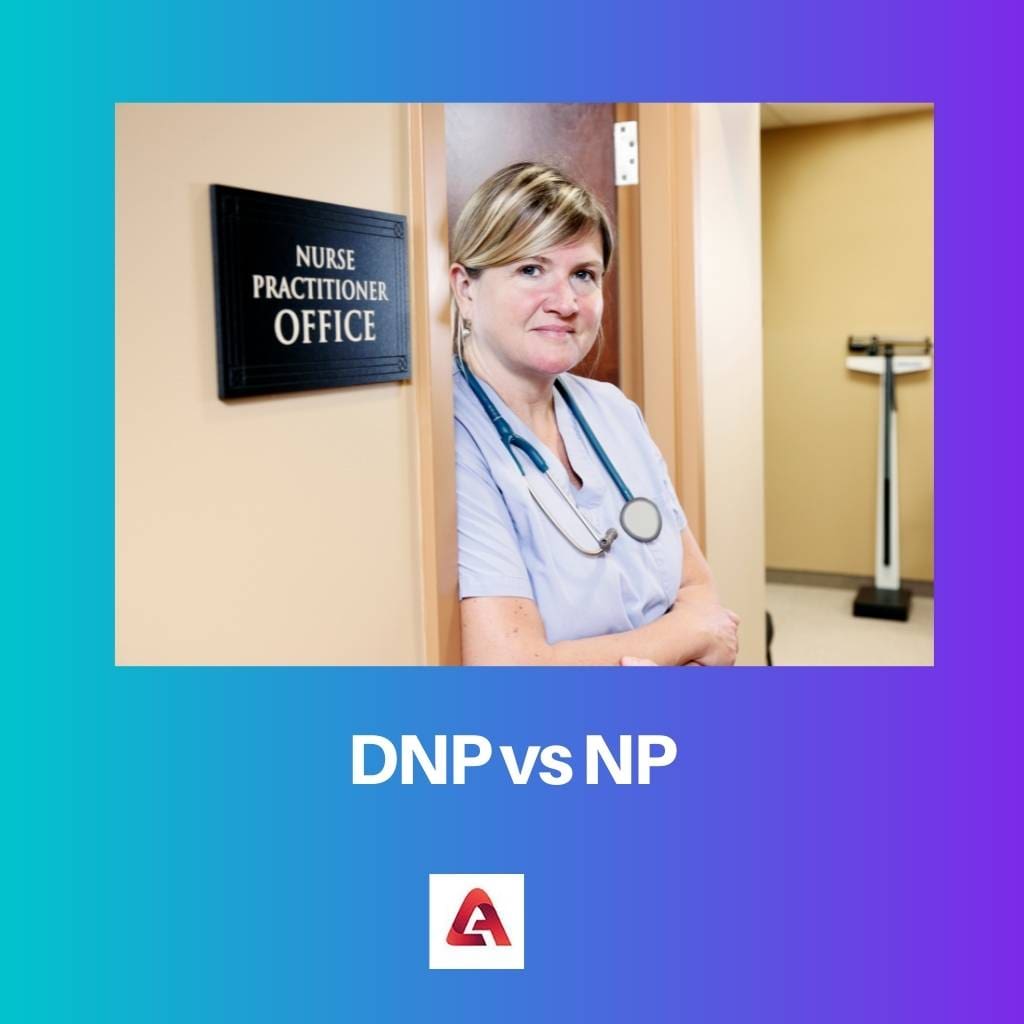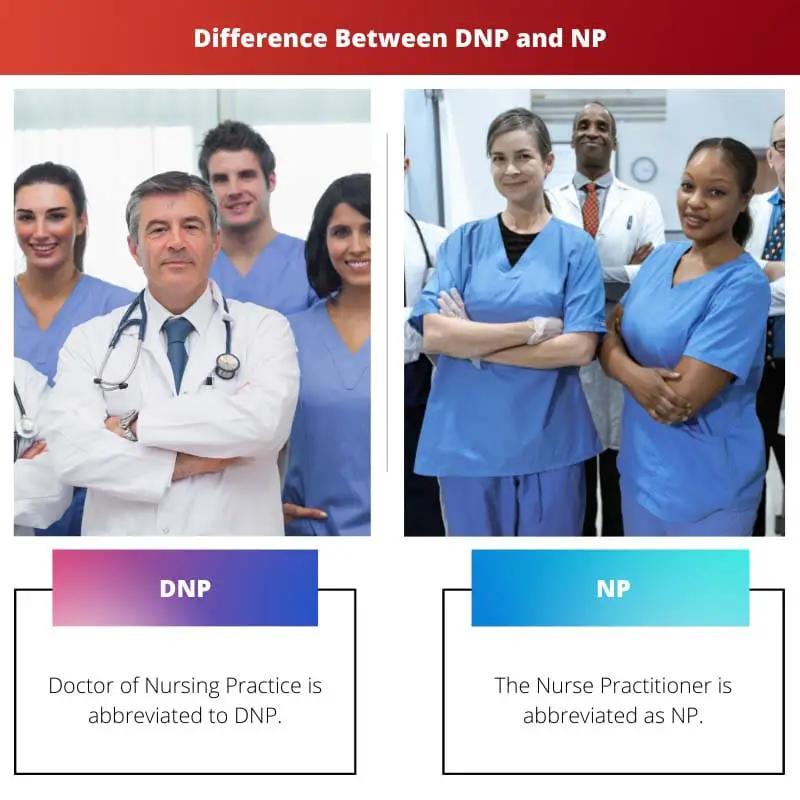If nurses wish to carry forward their nursing profession by receiving a master’s degree, they should think about their alternatives carefully.
Nurses in the early stages of their professions may be awestruck by the options, and they may wonder if they must become doctors to get a Doctorate of Nursing Practice or DNP.
Key Takeaways
- DNP stands for Doctor of Nursing Practice, while NP stands for Nurse Practitioner.
- DNP is a doctoral degree program, while NP is a career path within nursing.
- DNP graduates are qualified to practice as advanced practice nurses, while NP graduates have completed a master’s degree program in nursing.
DNP vs NP
The difference between DNP and NP is that DNP’s key goals are to give quality clinical expertise and to serve as a superior in the nursing field or among all nurses. However, on the contrary, An NP’s main goal is to act as a primary health care provider for patients, performing duties similar to those of a physician. A DNP must spend at least 1000 hours in clinical practice. However, A NP must complete at least 500 hours of clinical work.

Doctor of Nursing Practice is abbreviated as DNP. To become a DNP, you must first get an MSN or BSN, or any other master’s degree in the field. A DNP’s curriculum or training covers research-based and evidence-based methods, advanced nursing practice, and nursing leadership.
Leadership, healthcare improvement, and policy change are all outcomes of the DNP program. Clinical nurse faculty, positions in administration and policy, leadership positions, and nursing management occupations are all possible career paths with a DNP.
A nurse practitioner is abbreviated as NP. To become a nurse practitioner, you must get a bachelor’s degree in a field linked to BSN or ASN. An NP’s courses and curriculum includes direct patient care, clinical practice, and advocacy.
A high level of clinical skill is required as part of an NP program’s conclusion. Patient advocate and primary health care provider are two jobs that a person with an NP degree can get.
Comparison Table
| Parameters of Comparison | DNP | NP |
|---|---|---|
| Minimum Clinical hours | 1000 clinical hours. | 500 clinical hours. |
| Main objectives | Provide clinical expertise and act as a superior in nursing or of all the nurses, provide excellence. | To serve as a primary health care provider, by following the roles similar to a physician. |
| Course Requirements | MSN or BSN degree, any equivalent master’s degree. | Any bachelor’s degree equivalent to BSN and ASN. |
| Curriculum and coursework | Research and evidence-based practices, advanced nursing practice, nursing leadership. | Taking care of patients directly, clinical practice and advocacy. |
| Outcomes | Leadership, health care improvement, policy change. | The clinical expertise of a high degree. |
What is DNP?
Doctor of Nursing Practice is abbreviated to DNP. DNP’s key goals are to deliver excellence, clinical expertise and to serve as a superior in nursing or among all nurses. To become a DNP, you must have a master’s degree in nursing (MSN or BSN) or a master’s degree in a related profession.
Practices based on research and evidence, advanced nursing practice, and nursing leadership are all part of a DNP’s curriculum or coursework.
A DNP must complete 1000 clinical hours at the very least. Leadership, healthcare improvement, and policy change are among the results of the DNP program.
Clinical nurse faculty, administrative and policy positions, leadership positions, and nursing management professions are all possible career paths with a DNP. In actuality, the Doctor of Nursing Practice is a terminal doctoral degree in nursing that is comparable to a PhD in terms of academics.

What is NP?
The Nurse Practitioner is abbreviated as NP. An NP’s main goal is to act as a primary health care provider for patients, doing tasks that are similar to those performed by a physician. To work as a nurse practitioner, you must have completed a bachelor’s degree in nursing or a related field.
Taking direct care of patients, clinical practice, and advocacy are all part of an NP’s curriculum or education. A minimum of 500 clinical hours is required of an NP. A high level of clinical experience is required for an NP program’s outcome.
Patient advocate and primary health care provider are two of the jobs that a person with an NP degree can do. NP-pursuing people can provide direct health care by treating, diagnosing, and taking care of patients. They can also follow some common medical procedures and write prescriptions.

Main Differences Between DNP and NP
- DNP is the short form of Doctor of Nursing Practice. On the other hand, NP is the short form of the Nurse practitioner.
- The main objectives of DNP are to provide excellence, clinical expertise and to act as a superior in nursing or of all the nurses. On the other hand, the primary objective of an NP is to serve as a primary health care provider, following the roles similar to a physician to the patients.
- To become a DNP, one must complete his or her MSN or BSN degree or any master’s degree related to the field. On the other hand, to become an NP, one must finish any bachelor’s degree related to BSN and ASN.
- The curriculum or coursework of a DNP includes practices that are based on research and evidence, advanced nursing practice, and nursing leadership. On the other hand, the curriculum or coursework of an NP includes taking care of patients directly, clinical practice, and advocacy.
- A DNP at least has to devote a minimum of 1000 clinical hours. On the other hand, an NP is required to devote a minimum of 500 clinical hours.
- The outcomes of the DNP program include leadership, healthcare improvement, and policy change. On the other hand, the outcome of an NP program involves clinical expertise of a high degree.
- The employment opportunities that are related to a DNP are clinical nurse faculty, positions in administration and policy, leadership positions, and management jobs in nursing. On the other hand, the employment opportunities that are available to a person holding an NP degree are a patient advocate and primacy health care provider.




